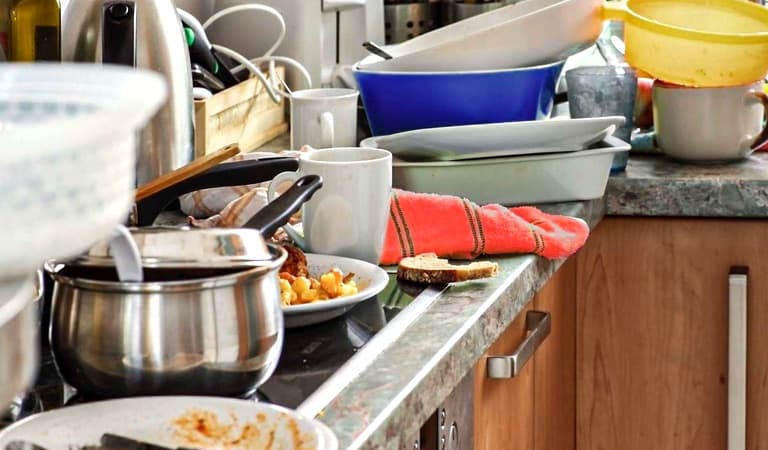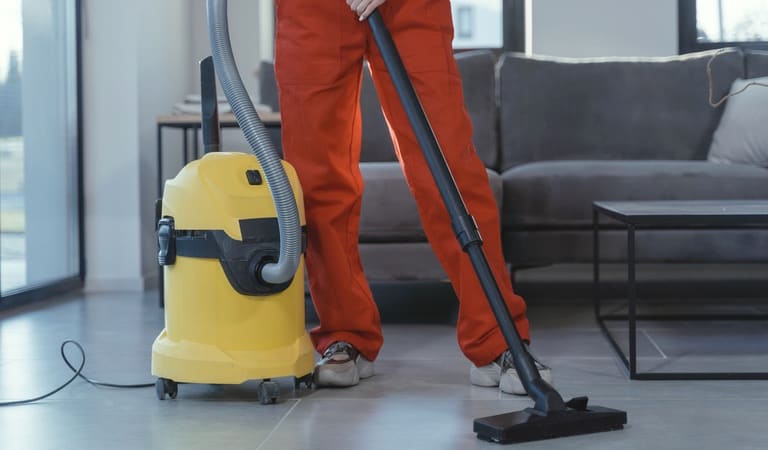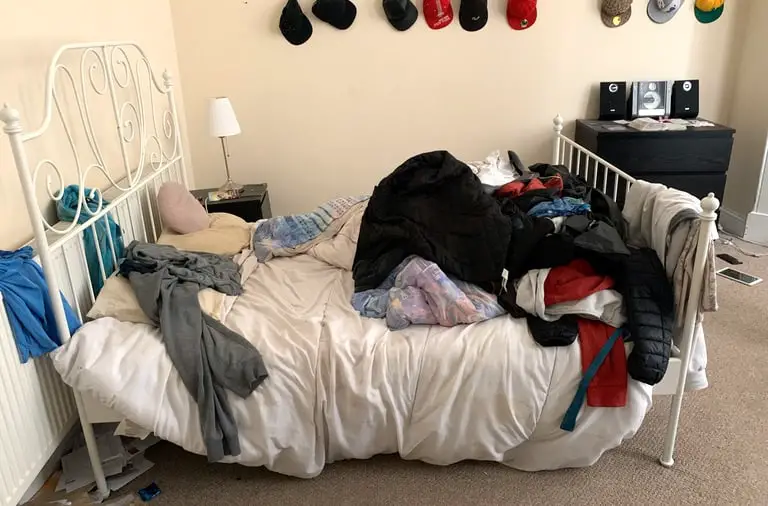Tenants that fail to clean can create unsafe and unsanitary living conditions which may also end up causing major property damage. A lack of cleanliness can be a precursor too many problems. Unclean living conditions can attract rodents and bugs and may end up making the property difficult to re-let. Eventually, the landlord will have no other option than to pay to repair and fix the damage. So the major question on most landlord’s minds is, can they tell their tenants how clean to keep their home?
Generally, if you feel that a tenant is violating health and safety conditions and causing damage to themselves, other people, and to the property, then you can tell them how to clean, and how often they should clean their home.
Most landlords have clauses in the tenancy agreement that require tenants to clean or maintain certain items in a property. Landlords can also send a notice to the tenant to clean the property if they discover the tenant isn’t keeping the property clean.
In this article, we will have an in-depth discussion on whether landlords can tell tenants how to clean their home, whether a tenant can be evicted for a messy home, how much a landlord can deduct for cleaning and whether landlords can make tenants pay for cleaning. So read on to find out more. This is sure to be an eye-opening read for you!
Contents
Can A Landlord Tell Tenants How Clean To Keep Their Home?
More often than not, how to clean and the importance of keeping a home clean, has for a long time been a bone of contention among many landlords and tenants. The issue is usually a major cause of dispute. Most tenants believe that the decisions on how and when to clean the property should be at their discretion. On the other hand, landlords have responsibilities which could be impacted if the tenant doesn’t keep their home clean.
To directly answer the question, yes! A landlord can tell a tenant how to clean and keep their home. This will, however, most of the time have to do with the provision within the tenancy agreement which both the landlord and tenant will have signed. If you are a landlord and you feel that the tenant is violating health and safety conditions, causing damage to themselves, other people, or the property, then you are well within your rights to tell the tenant to clean the premises.
Messy tenants are a risk to your property as unclean living conditions can attract rodents and bugs. It may also cause damage to the property and make it hard to re-let after the tenant moves out.
Therefore, if your tenancy agreement allows it, you can instruct your tenant(s) to clean their home and mend their ways or face eviction. If they do not comply, then you have the right to evict them after the tenancy agreement expires.
In most cases when a tenancy period comes to an end you can hire a cleaning company to clean-up the property and deduct the expense from the tenant’s deposit. This would require you to have clauses in the tenancy agreement detailing the terms and consequences. All comprehensive tenancy agreements will include a clause regarding the cleaning of the property.
If you don’t add the necessary clauses in the tenancy agreement, then you cannot tell messy tenants how to clean the property. The only possible solution in such a case is to wait until the tenancy agreement expires and then evict them if they refuse to comply.
Note that you cannot force the tenant to clean the rented property. You can only require them to keep it clean which is different. At the end of the tenancy, you can expect the tenant to return the property in substantially the same condition as when they first moved in.
As a landlord, it’s important to communicate your cleaning expectations to your tenants. You should also mention how they can achieve these expectations. They should be specific and clear and not confusing in any way. The expectations can cover when to clean, where to clean, how to clean, and any other essential aspects specific to the fixtures and fittings within the property.
You can make it your responsibility to visit the property frequently whenever a new tenant moves in or whenever you feel there are issues and point out the areas that will require regular cleaning. A good idea would be to clean the area yourself so the tenants can see how it’s done, and this will also give them the opportunity to ask any questions that they may have.
Different tenants will show different levels of cleanliness and care. You should be specific in communicating the requirements and needs. This will help make a potentially messy tenant understand what you are asking them to do, as they may not be aware of the requirements themselves especially if it is their first home.
Can Tenants Be Evicted For A Messy House?
For most landlords, ensuring that the property is kept clean is one of the most troublesome issues whenever a tenant moves into a property. Keeping an unclean rental property can cause a lot of problems. From rodents to bugs to mould and disease, an unclean property can cause many problems for both the tenant and landlord.
The truth of the matter is that a tenant can be evicted for keeping an unkempt or unclean property. It should be mentioned, however, that in the UK, as a landlord you would have to follow strict legal procedures to evict a tenant before their tenancy agreement comes to a close.
We all have our definitions of what it means to be clean and some people simply don’t mind living in squalor. In most cases, such tenants can be evicted for their poor hygiene.

So with this in mind, in what instances would a tenant be regarded as messy?
- If you identify rodent and bug infestations in the property (live, dead, or faecal matter from them).
- If mould starts growing on the walls of their rented property.
- If they have pets and the pets don’t use litter boxes.
- If the garbage is not dispensed from the house within one week.
- If the rental property begins to smell.
- If there are dirty dishes or rotten pieces of food in the kitchen.
- If appliances appear to be dirty and it’s affecting their performance.
- If there are hazardous and toxic chemicals left carelessly around the property.
- If there is permanent dirt on the walls, floors, or work surfaces.
- If there is dirt to the point that it interferes with the infrastructure of the building.
- If there is clutter or signs of hoarding.
- If there is improper air circulation that is caused by blocked air vents or furnace intakes.
If a tenant has any or a combination of these conditions within their rented home, you as the landlord have the right to request that they remedy and clean it. If the tenant doesn’t comply, you are within your rights to start the eviction process.
Once the tenant moves out, you can hire a cleaning company to clean up the mess left by the tenant. And these expenses can be deducted from the tenant’s deposit.
Just to be sure, you can add clauses to the tenancy agreement stating the cleaning requirements and the consequences of not adhering to them. This is the best way to prevent dirty and messy behaviour. The clauses should outline rules for the maintenance and upkeep of the property, which will give tenants the incentive to clean. Having consequences as well as legal grounds for their failure, will make things much easier for you as a landlord.
In the case of hoarding, it may be a little difficult. According to the Fair Housing Act, hoarding is considered a mental disorder and disability. You are therefore not allowed to evict a tenant because of hoarding since it could be classed as discrimination. There are however other reasons for evicting a hoarding tenant such as tenancy or fire safety violations.
How Much Can A Landlord Deduct For Cleaning?
Without a shadow of a doubt, the end of a tenancy can be a stressful experience for both a tenant and a landlord. This part of the rental process raises so many questions, prominent among which is whether a landlord can charge a tenant for cleaning and, if so, how much.
Surprisingly or not, the primary reason for deposit deductions is tenants leaving a rental property in a poor state of cleanliness. This is why it’s usually important for tenants to do an end of tenancy clean and leave the property in a good, or even better condition than when they first moved in.
A lot of housing contracts are full of clauses that require a tenant to professionally clean a rental property before moving out. It is their sole decision, however, whether they will do this themselves or hire a cleaning service.
One question that arises is can you as a landlord charge tenants for cleaning? Well, according to the Tenant Fees Act 2019, it is illegal for landlords to charge tenants with a professional end of tenancy cleaning service. In addition to this, if you charge a tenant cleaning fees you can be penalised with a fine of up to £5,000.
But even though you cannot charge tenants for cleaning services, you can still use the tenants deposit to cover any costs to get the property back to the condition it was in when they first moved in. So if a tenant fails to clean the property and leaves it in a dirty state, you can use the tenants deposit to clean the property, which may involve hiring professional cleaning services.
For normal wear and tear, however, you cannot make any deductions from the tenants deposit. Normal wear and tear means the declining condition of the rental properties fixtures and fittings that occurs over time even though the tenant has been cleaning and maintaining the property regularly.
For you to make a claim on the tenants deposit, there would have to be something like food and dirt on the walls, floors or surfaces, or damage to appliances that was listed within the tenancy agreement and/or inventory.
It should be mentioned that before you decide to dip into the tenant’s deposit to clean the property back to the condition they received it in, you will need to raise any issues with the tenant first. This will allow them to resolve the issue themselves. Needless to say, you shouldn’t return the tenants deposit until the property is returned to you in its appropriate condition.
To make a valid claim for using the deposit to cover cleaning costs, you will have to prove to the Tenancy Deposit Scheme what the condition of the property was like before the tenant moved in. Taking photos of the condition of the property on your smart phone at the start of the tenancy, is a great way of doing this as each picture will be date, time and location stamped.
Can Landlords Make Tenants Pay for Cleaning?
No! Landlords cannot make tenants pay for cleaning services if the tenant meets his/her cleaning obligations as a renter. In the past, many landlords included a “professional cleaning” clause in their tenancy agreements. Tenants were often forced to pay up to £400 to use cleaning services for as short as a 6 month tenancy. This is however no longer the case after the introduction of the Tenant Fees Act.
A tenant is however required to return the rented property in its original state of cleanliness when he or she moved into the property. If this is not the case, then the landlord can claim against the tenants deposit to fund the cleaning of the property.
Tenants can choose to do the cleaning work themselves to avoid incurring any cleaning costs.

How Can I Protect My House From Tenants?
Once a tenant has taken up residence in your rental property, it can be extremely time consuming and costly to have them removed. As a landlord, you have many responsibilities and the most important one is to ensure the property doesn’t fall into disrepair. So you have to protect your property from tenants. You can achieve this by:
Checking References
You shouldn’t just ask for references from potential tenants and then be satisfied if they provide some names and contact information. Make sure you follow up with all the people listed by the tenant.
Always keep in mind that the best references in this situation aren’t from family, friends, or roommates, but previous landlords. If you have concerns about the tenant keeping the property clean, ask about this in your reference check.
Include Routine Maintenance In The Monthly Rent
To ensure that your property stays in top shape, you should protect your investment by having someone other than the tenant carry out maintenance within the property.
Advise The Tenant To Provide Their Own Insurance
It can be a good idea to stipulate in the tenancy agreement that the tenant should obtain their own insurance to cover their own contents, including liability cover and accidental damage to the property and the landlords contents. This way, if anything unfortunate happens, the tenant can avoid losing their deposit.
Include Property Protection Clauses In The Agreement
To ensure that your property is protected, you can add clauses in the tenancy agreement that will ensure your property is safeguarded at all times. Having a tenant sign such an agreement will make them liable should anything untoward happen to the property.
You can also have additional clauses as a way of preventing the dirty and messy behaviour of the tenant. Such clauses will outline the rules for maintenance and upkeep of the property.
Conduct Regular Inspections
Inspections are a chance for you to ensure that your property is being looked after. By having regular inspections, you can identify any problems before they become serious. This will help protect your property.
Inspections will also tell you whether the tenant is keeping the rental property in a good clean condition and whether they are maintaining the property well. I would recommend doing this at least once every 6 months. Just ensure you give the tenant at least 48 hours notice before you visit.
Talk To The Tenant
You should talk to the tenant and be upfront and honest with them. An effective way of ensuring your property is protected, is to build trust with your tenants by talking to them. This will make it easier for you to raise any issues you may have with the safety and maintenance of your property, and it will also make it easy for the tenant to raise any maintenance issues that require the attention of the landlord.
Use A Reputable Letting Agent To Provide A Tenancy Agreement
Don’t be cheap and buy tenancy agreements off the internet if you don’t have any previous experience as a landlord. Such agreements usually have lots of loopholes that may put your property at risk. Instead, use the services of a reputable letting agent. This will ensure that you enter the agreement with the knowledge that your property will be taken care of since you have legal backing to take action in case anything happens.
If you are considering using an online letting agent, you can look at my recommendation here. If your preference is to use a high street letting agent, you should take time to read my ’20 Tips When Looking For A Managing Agent’.
All in all, as a landlord, ensuring your rental property is kept in a high state of cleanliness is quite important!


